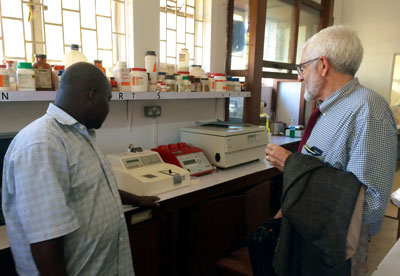
Give a man a fish and you feed him for a day,” goes the familiar Chinese proverb. “Teach a man to fish and you feed him for a lifetime.” That’s the principle behind the recent launch of the Alliance for Global Health and Science (the “Alliance” or AGHS), which seeks to build the capacity for biological laboratory science in developing countries, enabling them to confront their most pressing health threats.
The Alliance will be a partnership between UC Berkeley’s Division of Biological Sciences and the School of Public Health administered jointly through the Henry J. Wheeler Center for Emerging and Neglected Diseases (CEND) and the Center for Global Public Health (CGPH).
The launch was funded by a $1-million gift from Chairman, President, and Chief Executive Officer of Aduro Biotech Stephen T. Isaacs, a Berkeley alumnus who is passionately interested in education and health in emergent nations.
“It’s often difficult to connect basic research with real-world applications,” says CEND Faculty Director Jeffery Cox, who is also a professor of Molecular & Cell Biology. “Exposing the scientific community to global problems informs our research, as well as the other way around.”

laboratory are, from left to right, Denis Kasozi Matovu,
Lecturer, Department of Biochemistry, Makerere University;
and Art Reingold, Professor of Epidemiology,
UC Berlekeley School of Public Health.
According to AGHS Executive Director Michael Eichberg, another Berkeley alumnus, over the first two years the Alliance plans to support up to 28 graduate students and post-docs — with roughly half spending some time on the Berkeley campus. It also hopes to support up to six new research collaborations between Berkeley and overseas faculty. “This will enable our faculty and students to engage in scientific exchange with researchers they would be unlikely to encounter otherwise,” he says. “It’s a real innovation to build a training and research program like this that includes basic biological sciences.”
Isaacs’ gift will fund the pilot phase, which focuses on East Africa and strengthens Berkeley’s current partnerships with institutions such as Makerere University (MU) in Uganda and the University of Zimbabwe (UZ). The pilot will be led by Arthur L. Reingold, M.D., a professor of epidemiology and a world-renowned expert in infectious diseases. Dr. Reingold has decades of experience with collaborations in Africa. In the years ahead, AGHS hopes to expand to other regions including Latin America, China, and South Asia.
This April, Isaacs, Reingold, and Eichberg visited MU and UZ along with Sarah Stanley, Assistant Professor of Immunology and Pathogenesis and of Infectious Diseases and Vaccinology. They toured the schools’ research facilities and met with molecular biology, immunology and biochemistry faculty and graduate students. “I was impressed with the quality of the students and the strength of their research questions,” says Dr. Stanley. “But I was really blown away by their dedication. Most of these students support themselves, have limited funding for their work, and must share key equipment and space, yet their insatiable desire to do great science drives them to overcome these challenges.”
Future areas of research may address tuberculosis; vectorborne diseases; cancer; antimicrobial resistance; persistent and cancer-causing viral infections; and the confluence of infectious and non-communicable diseases, emphasizing molecular biology, immunology, genomics, molecular and field epidemiology, and the design and development of vaccines, therapeutics, and diagnostics tests.
“Science is a cross-disciplinary enterprise,” says Dean of Biological Sciences Steve Martin. “Often we see discovery result from these handshakes across traditional lines of expertise and experience.” Dean of the School of Public Health Stefano Bertozzi adds, “We have faculty experts working in each of these regions, many on long-term projects in collaboration with regional allies. We’re looking forward to partnering with the Division of Biological Sciences to expand our focus on empowering these communities.”
The Alliance for Global Health and Science will include:
- Student, post-doctoral, and faculty fellowships and exchanges
- In-country training institutes for hands-on learning
- Online and distance learning initiatives
- A seed grant program to promote collaborations
- Early-stage career support for low- to middle-income scientists from developing countries
To learn how you can support the work of the Alliance and the Department of Molecular & Cell Biology, contact the MCB Co-Chairs at mcbchair@berkeley.edu.




